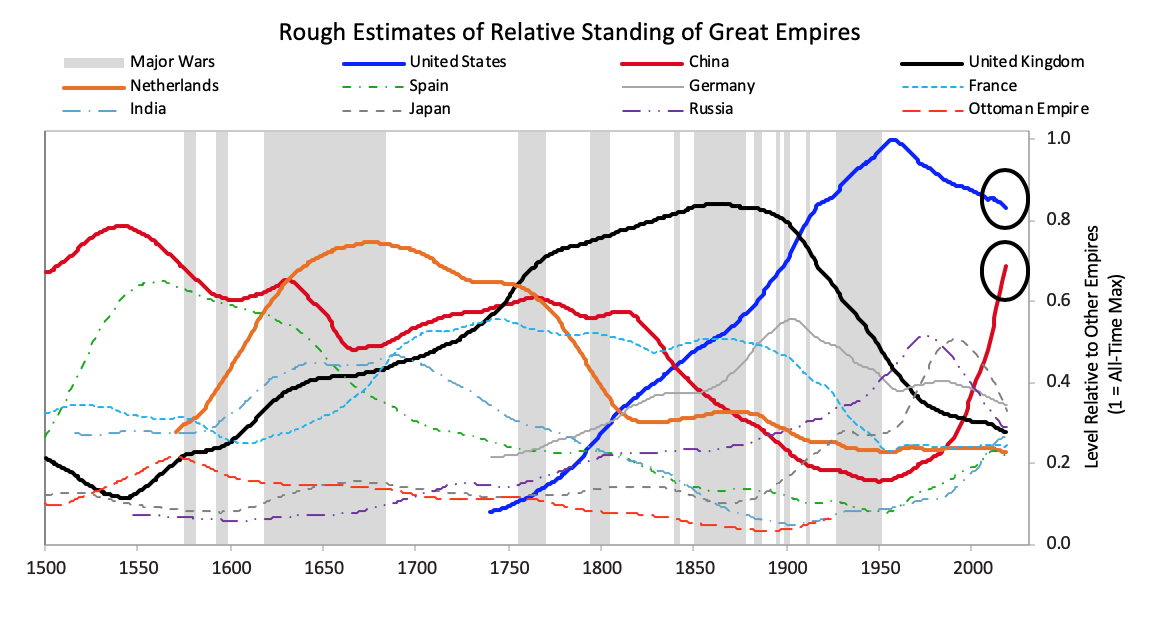Throughout history, the rise and fall of empires has been a common occurrence.
In this essay I will argue that empires are the result of one group of people having a superior technology, organization, or ability and then “conquering” others. However, as others on the fringes, and within the empires, learn those technologies and catch up, the empire loses its power and influence.
It might sound simple and “obvious” but it has huge implications.
1) It means the empires may have a natural time limit and follow their own arc, if left to their natural accord
2) It means that there is a huge importance of learning, improving, innovating
3) We need to be, not just open to, but actively seeking out, change and improvements. Such as:
– We need to design our systems in such a way that they are flexible to improve
– They are able to carrying out micro-experiments, or MVPs on smaller scale areas,
– And promoting competition within big, complex systems.
– We need to be sharing the vision and direction
– We need values that align with this rule of continual innovation and improvement.
In this article, we will explore the progress of some of the most significant empires in history and how they rose and eventually fell due to a loss of relative superiority.

The Mongol Empire was one of the largest empires in history. The Mongols were able to conquer such a vast territory because of their superior military technology, especially their horseback riding and archery skills. The Mongols’ primary advantage was their use of the composite bow, which was smaller and more powerful than other bows at the time. However, as other groups learned these tactics, the Mongols’ advantage diminished, and their empire fell.
The Greek Empire is famous for its achievements in philosophy, mathematics, and art. The Greeks’ power came from their knowledge and their military tactics. They invented the phalanx formation, which allowed them to overcome armies that were much larger than their own. However, as other groups learned their tactics, the Greeks lost their advantage and their power declined.
The Roman Empire’s superiority lay in its organization and bureaucracy. The Romans were able to govern their vast territories efficiently because of their sophisticated infrastructure and administrative skills. They were also able to integrate conquered peoples into their empire, which gave them an advantage. However, the Roman Empire’s decline began when its leaders became corrupt and their military technology fell behind that of their rivals.
The British Empire was one of the most significant empires in history. The British’s primary advantage was their navy, which allowed them to control the seas and thus trade. The British were also innovative in their use of steam power, which allowed them to industrialize and become a dominant force in the world. However, the British Empire’s decline began when other countries started to catch up in terms of industrialization and technology.
The American Empire’s power came from its size and wealth. The United States was able to become a superpower because of its vast territory and natural resources. The American military was also the most technologically advanced in the world, giving them an advantage. However, the American Empire is on a relative decline in GDP terms in the last 50 years. It remains to be seen how long America can be an empire and what would come next.
In conclusion, empires rise and fall because of a gain and then loss of superiority. To become an empire or defend from becoming someone else’s empire, it is necessary to keep innovating to develop some kind of advantage over others. Innovating in terms of economy, financial, military power. Innovation can lead to more advantages, which will give a country a better chance of maintaining its power and influence. However, history has shown that no empire has lasted forever. Change is the only constant.
